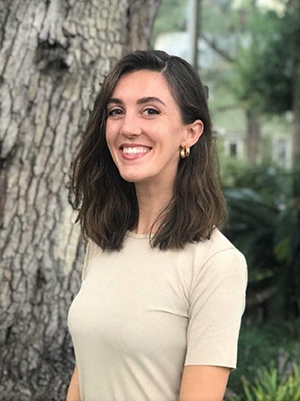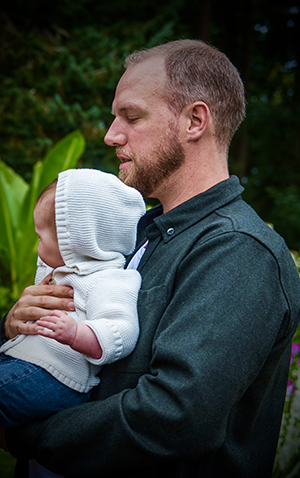Field Notes: David Eso in Conversation with Caroline Harper New

Poetry Editorial Board member David Eso talks with Caroline Harper New, winner of the 2023 Open Season Poetry Award with her poem, “Interview with a Cervidologist” (featured in spring issue #222). They discuss the value of a trusted first reader, the telescoping of time, and the geographic, mythological, religious, and cultural landscapes of home.
Read "Interview with a Cervidologist" here.
Caroline Harper New is a writer and visual artist from Bainbridge, Georgia. Rooted in the Gulf Coast, her poems turn to natural disaster, scientific discovery, and stories of obsession to trace the line between love and ruin. In doing so, her work reckons with concepts of extinction, often straddling archaeology, politics, folklore, and ecopoetics.
In addition, she has done ethnographic research in Madagascar, visual art for TV series in New Orleans, and interdisciplinary eco-collaborations in Wyoming. She received her BA in anthropology from Davidson College and her MFA in Poetry from the University of Michigan, where she is currently a post-MFA Zell Fellow and the Dzanc Writer-in-Residence.
She is currently preoccupied with semiaquatic things, like mermaids, swampland, and waterbirds.
Cervine-savvy though I may be, new information reached me from reading your piece. Deer with fangs? What a wonder! Could you reflect on the creative process for making poetic insight and biological information work in tandem?
The tension between scientific information and my poetry has been quite a conversation with my peers. Balancing beauty and fact and metaphor and comprehension can be tricky and is perhaps one of the most common critiques I receive. Honestly, having a trusted reader who can tell you when you’re being opaque or indulgent is invaluable. My writing would probably be incomprehensible without those people, namely my close friend Abigail McFee.
For this poem in particular: I love listening to science podcasts while I run. My favorite is Alie Ward’s podcast Ologies. She has this one episode on cervidology that just fascinated me—the ways creatures evolve to survive is beyond imagination. Every time you learn something new, it incites new questions. Cervix comes from the root for neck—what does that have to do with antlers? With the womb? How do we control? Why the women deer? Fangs! Each fact is a rabbit hole.
I’m enamored with science, but I know not every reader of poetry is. So I try to ask myself: How can I make others see the wonder in this? How can I make them see the relevance in their own lives? I’m obsessed with the idea of ecosystems—not only of biological communities, but of knowledge, culture. Being able to illuminate these connections and create an empathy with the natural world is what I value most in these poems.
What a pleasure to interview you about an interview poem! I seem to hear the questioning-and-responding voices locking and weaving like antler prongs. Could you say a bit about creating an “interview” poem that defies the Q & A format?
Sometimes—most of the time—you figure out what a poem is about as you’re writing it.
This poem originally started in more of a typical Q&A back-and-forth. It was also about six pages long, before my peers (thankfully) suggested cutting it down, as they often (thankfully) do. When I trim a poem, it’s the tendons that go first—those little pieces I included for context, explanation—essentially, the pieces I included out of fear of being misunderstood.
As I was carving and carving, I realized the original characters of the interview had disappeared, and that a dark, masculine voice was emerging. The power dynamics that accompanied that—the interruption, the condescension, the talking-over—were more powerful, and resonant, than keeping a balanced Q & A. By this point, the poem was no longer about deer. It was my own experience, as well as my loved ones’—the frustration of dismissive doctors, the fear of unwanted pregnancy, the desperation of seeing your options dissolve. The second person point-of-view is difficult to pull off in writing, but in this case, it was very intentional.
Your poem’s literary and animalistic surfaces play out against a political backdrop—namely, recent changes to abortion laws in the United States and Georgia House Bill 48 (which you reference). Why did you choose to make deer central to this politically charged poem?
The moment that comes to mind is when I found the poem’s ending point. I came across a Northern Wilds article from 2015, in which there was a quote by the author-hunter Shawn Perich: “Maybe Sigmund Freud, were he a deer hunter, would have an explanation. Perhaps, by going inside a dark box, the modern deer hunter re-enters the womb.” A hunter’s dark romanticization of the body he came from as synonymous with the body he hunts, as well as the implications of a fraught character like Freud, brought all of these political anxieties to the surface. The animal fear that myself and loved ones have felt in this political landscape suddenly had a body.
When I wrote this poem, I remember thinking it may only be relevant for a brief period of time, that surely these issues would bend more toward resolution in the coming years and this anxiety would cease into memory. But it’s been quite the opposite.
For all of us living in other parts of the world, what do we need to know about tucked away places in the American Gulf Coast, such as your hometown of Bainbridge, Georgia? Has the region imprinted itself on your creative endeavours?
I love this question. Everything about my writing comes back to the landscapes of this region. Geographic, mythological, religious, cultural.
Bainbridge is on the border of Georgia, Alabama, and Florida, nestled right in between the swamps and the forests and the oceans. It’s a magical landscape. There are alligators—these beautiful prehistoric creatures, that have survived 150 million years with very little evolution—in your backyard. The coast is wild and undeveloped. You walk down the beach and see horseshoe crabs, 445 million years old. Migrations of animals are constantly en route across the sky and sea.
Everything is connected by water, and all of it a different species. Springs glow naturally with radium. Creeks are dyed ruby by the constant decay of the swamps. Lakes empty into sinkholes and re-appear, years later. Time is bared dry then swallowed up again. The line of the coast is determined by the hurricanes; one day there’s land, the next there’s ocean. The land itself is alive.
Growing up in this precious, precarious landscape, you can’t help but feel both in awe and at the mercy of everything around you. Certain themes in my work descend directly from this: transmogrification, the telescoping of time, the bitterness of devotion. And this is all against the very dark, human history of the American South. Things change slowly. Painfully.
What literary traditions have shaped or been shaped by your home?
This is something I’m only starting to become aware of myself. I studied anthropology in undergrad and have felt largely unexposed to the literary canon, if you will. So, admittedly, most of these connections have been pointed out to me by others.
After reading my work once, Fred Moten very kindly connected my poetry to Caribbean literary traditions. I’m only now becoming aware of this community—Zora Neale Hurston, McDaniel Mackey, M. NourbeSe Phillip, Garcia Marquez, Flannery O’Connor, William Faulkner, Wallace Stevens, Edward Glissant, Toni Morrison, Carlos Fuentes. Writers of weather, swampy weirdness, magical surrealism. The landscapes and realities they come from interlock with my own, even though I wasn’t familiar with their work before.
During my MFA, I started to have some of my own epiphanies. I found unexpected kinship with Jesmyn Ward, Carmen Maria Machado, Toni Morrison, Junot Diaz, and Barbara Kingsolver. There were so many moments where I thought, finally: That’s it. That’s how I am familiar with time.
My “home” is not only in the South, but in anthropology. This field impels a particular way of looking, paying attention; you take heed of temporal continuities, webs of influence, acts of transformation between people, generations. Zora Neale Hurston, also an anthropologist, testifies to this in her own work: how you are both visitor and interpreter, even in your own home. My writing is still tangled most intimately with these frameworks. By allowing my field notes to slip into poems, they are allowed to encompass the surreal, the fantastical, the mythological, the personal.

David Eso
* * * * * * * *









